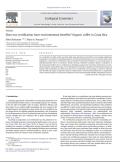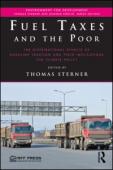

This book challenges the conventional wisdom that gasoline taxation, an important and much-debated instrument of climate policy, has a disproportionately detrimental effect on poor people. Increased fuel taxes carry the potential to mitigate carbon emissions, reduce congestion, and improve local urban environment. As such, higher gasoline taxes could prove to be a fundamental part of any climate action plan. However, they have been resisted by powerful lobbies that have persuaded people that increased fuel taxation would be regressive. Reporting on examples of over two dozen countries, this book sets out to empirically investigate this claim. The authors conclude that while there may be some slight regressivity in some high-income countries, as a general rule, fuel taxation is a progressive policy particularly in low income countries. Rich countries can correct for regressivity by cutting back on other taxes that adversely affect poor people, or by spending more money on services for the poor. Meanwhile, in low-income countries, poor people spend a very small share of their money on fuel for transport.
The objective of this research is to identify and quantify the motivations for organic grain farming in the United States. Survey data of US organic grain producers were used in regression models to find the statistical determinants of three motivations for organic grain production, including profit maximization, environmental stewardship, and an organic lifestyle. Results provide evidence that many organic grain producers had more than a single motivation and that younger farmers are more likely to be motivated by environmental and lifestyle goals than older farmers. Organic grain producers exhibited a diversity of motivations, including profit and stewardship.
Global warming and other impending environmental mega-problems call for a new technological paradigm. The urgency of the development and deployment of technological solutions is such that governments will need to make widespread use of ‘carrots and sticks’ to ensure that next-generation technologies are developed and deployed, more demanding standards and regulations are applied and stricter enforcement is guaranteed. To capture the main elements of this paradigm shift, we introduce the concept of Sustainability-oriented Innovation Systems (SoIS). SoIS make particularly high demands on governance, because governments need to disrupt unsustainable technological pathways and encourage alternative technologies long before they reach the stage of commercial viability. This implies picking winners in situations of technological uncertainty and highly disparate stakeholder preferences. SoIS also build on new types of policies that help to internalise environmental costs. The policy-driven nature of technological development may possibly result in a wide divergence of national technological trajectories.
This report presents and analyses policies, programmes and approaches for the development, market introduction and diffusion of green cars. It reviews government policies (including public procurement and regulations and standards) in a number of OECD countries as well as a selection of non-OECD economies. The report attempts to provide: i) a better understanding of the growing market for green vehicles; ii) new analytical instruments to identify policies and approaches that could be designed and put in place, notably with the aim of fostering the uptake of green cars; and iii) to the extent possible, insights into the efficiency and effectiveness of existing policies, as well as guidance on how to assess the impact of future measures.
